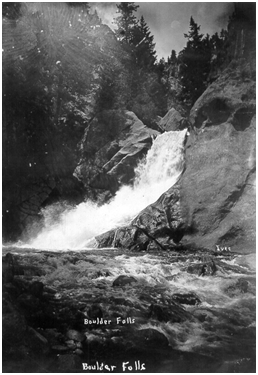Water Records
About Water Records
As the repository for state and local government records, the Colorado State Archives includes records from the three branches of government, counties, some municipalities and special districts. Records relating to the history of water use policy and law are reflected in court cases, governors’ records, legislation and agency records from particularly the Departments of Natural Resources, Public Health and Environment, Agriculture, Local Affairs and the Secretary of State’s Office.
From the Supreme Court we have the important precedent-setting cases that provided the foundation for western water law since the 1870’s as well as the cases up to 2013. We also have Court of Appeals cases from 1891-1911 and 1970 - 2010. Water cases were generally filed in the county district courts until 1969 when the water courts were established. Many of the pre1969 water cases were sent to the water courts for use and storage. A few water courts and counties have sent us cases and water records for permanent archiving. At the present time researchers must give us the actual court case numbers in order for us to locate the files. These are usually found by contacting the court where the cases were filed as they hold the name/caption indexes.
The governors’ involvement in state and national water policy as well as interstate water compacts is well documented in these records through correspondence, reports, investigations, litigation files, interaction with the legislature, speeches, publications and other subject files. The governors were extremely important in the development of the water compacts and interacted with governors and other officials in the United States to fairly appropriate the very limited water resources in the more arid western states.
Also under the Executive Branch are the Departments that report to the governor but receive funding from the legislature. These include the Department of Natural Resources under which the Division of Water Resources, the Colorado Water Conservation Board, Division of Wildlife and the Division of Parks and Recreation have archived records of enduring value. The Department of Public Health and Environment records focus primarily on water pollution issues while the Department of Agriculture documentation emphasizes farming and agriculture. The Department of Local Affairs collections include the Moffat Tunnel Commission from 1924-1999, special district creation of water and sanitation districts, dissolution/consolidation files (including irrigation districts) and tourism records documenting the importance of agriculture and water to the state’s development. The Secretary of State’s Office has archived incorporation records for all kinds of water-related companies. These records include information about the original incorporations, their officers and directors, the function of the company, where they operated, changes of names, mergers, dissolution information and the annual fiscal status reports. Water issues are well documented through correspondence, subject files, reports, investigations, studies, publications, photographs, maps and other records in these collections.
All legislative bills are documented through the territorial and statehood statutes, House and Senate Journals, the Session Laws, the originally drafted bills and the changes that were made to them through the legislative process, and the final signed bills. After 1972 the legislative process was recorded including hearings from the legislative committees, and House and Senate floor actions. Accompanying these recordings are Legislative Summaries which are minutes of the committee hearings and attachments given out to legislators concerning the various bills. Legislative intention and discussions about the bills are of primary importance to the understanding of past and current water laws.
Finally, county and municipal records from the county clerk’s offices, public works sections, city councils or other offices may have records regarding water issues. The Archives does not have all county or municipal records so researchers will have to contact us about specific counties or municipalities that they are interested in.
How to Find Information
Records available at the Colorado State Archives
This page contains finding aids outlining the many resources available for in-person research or by request.
